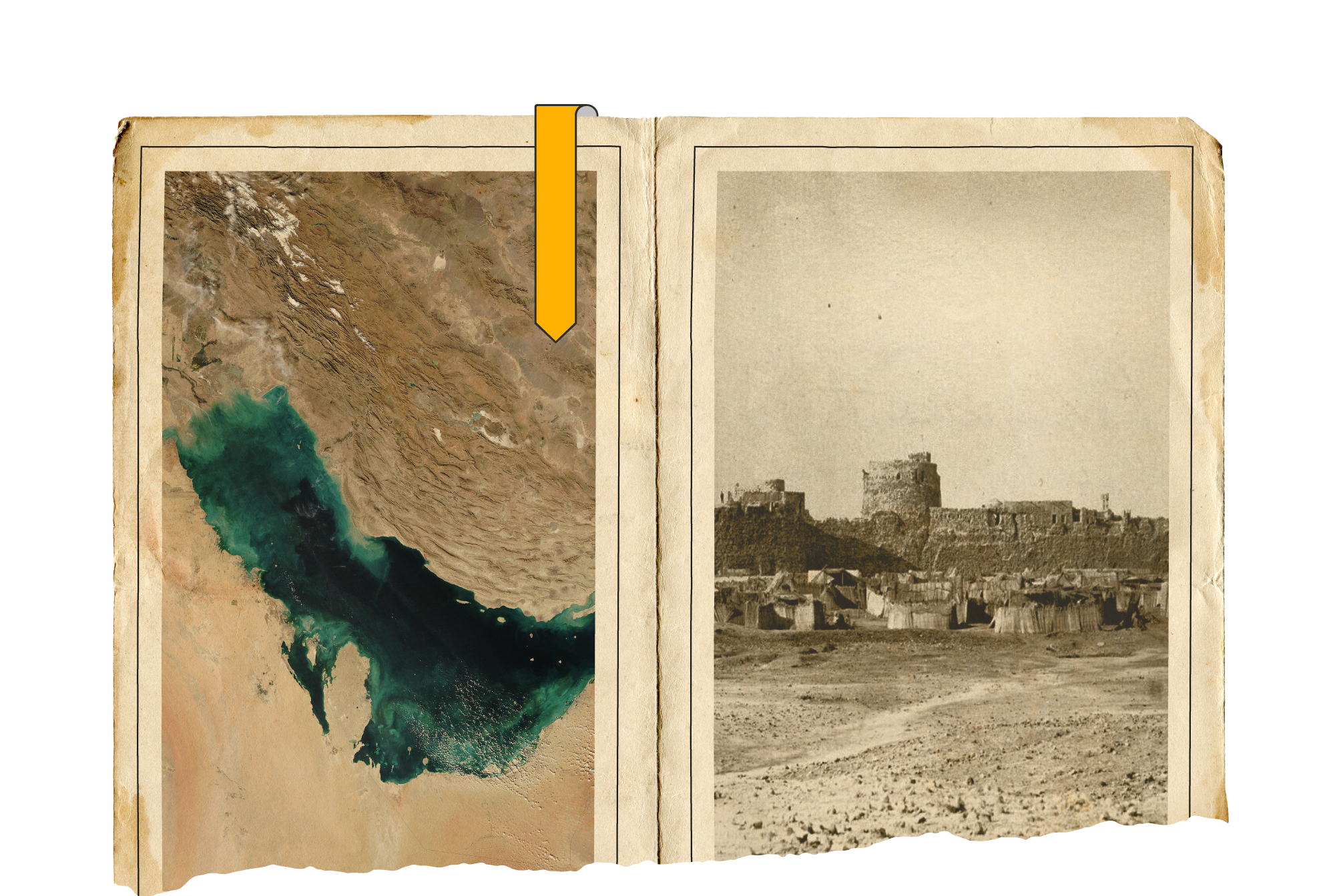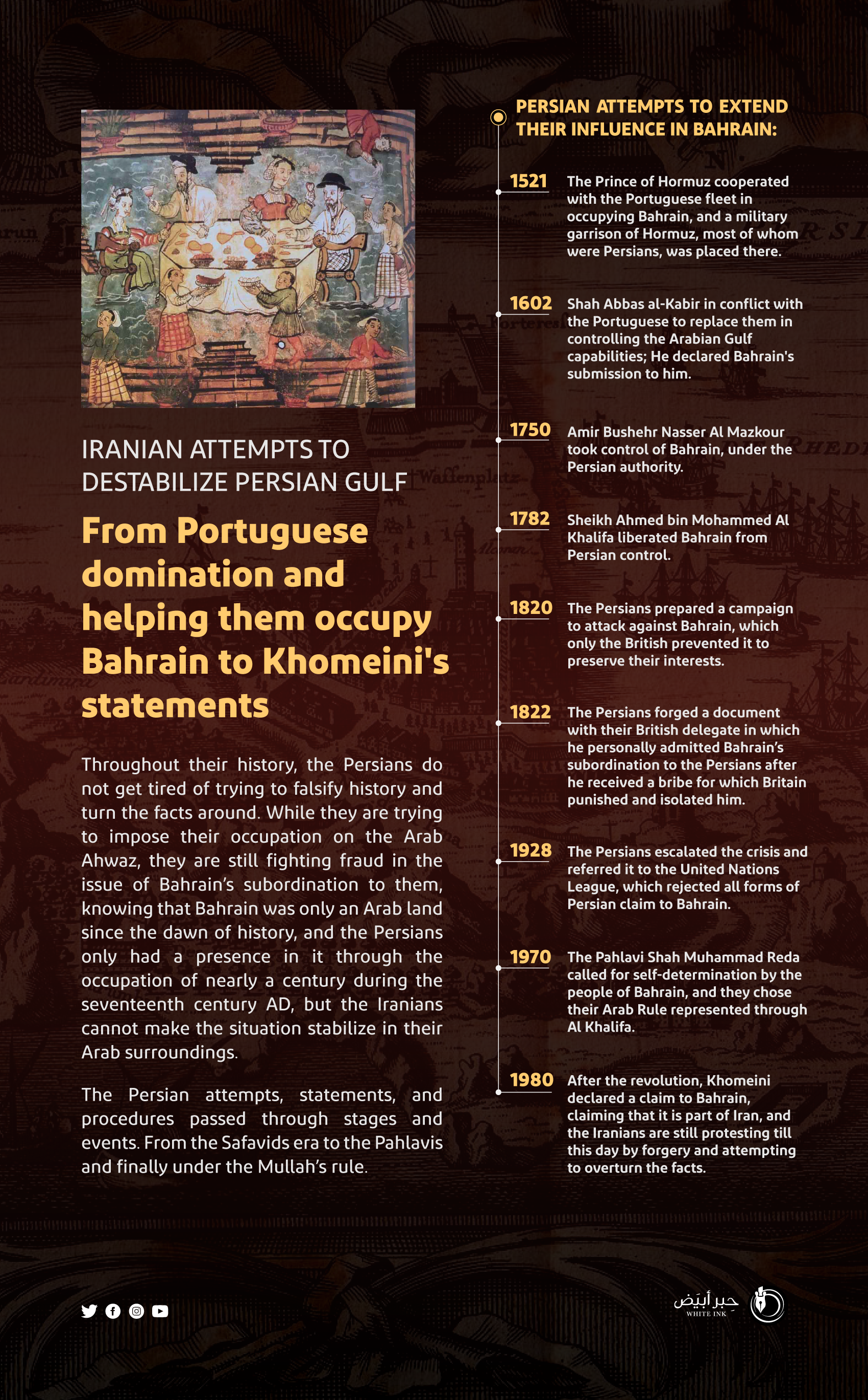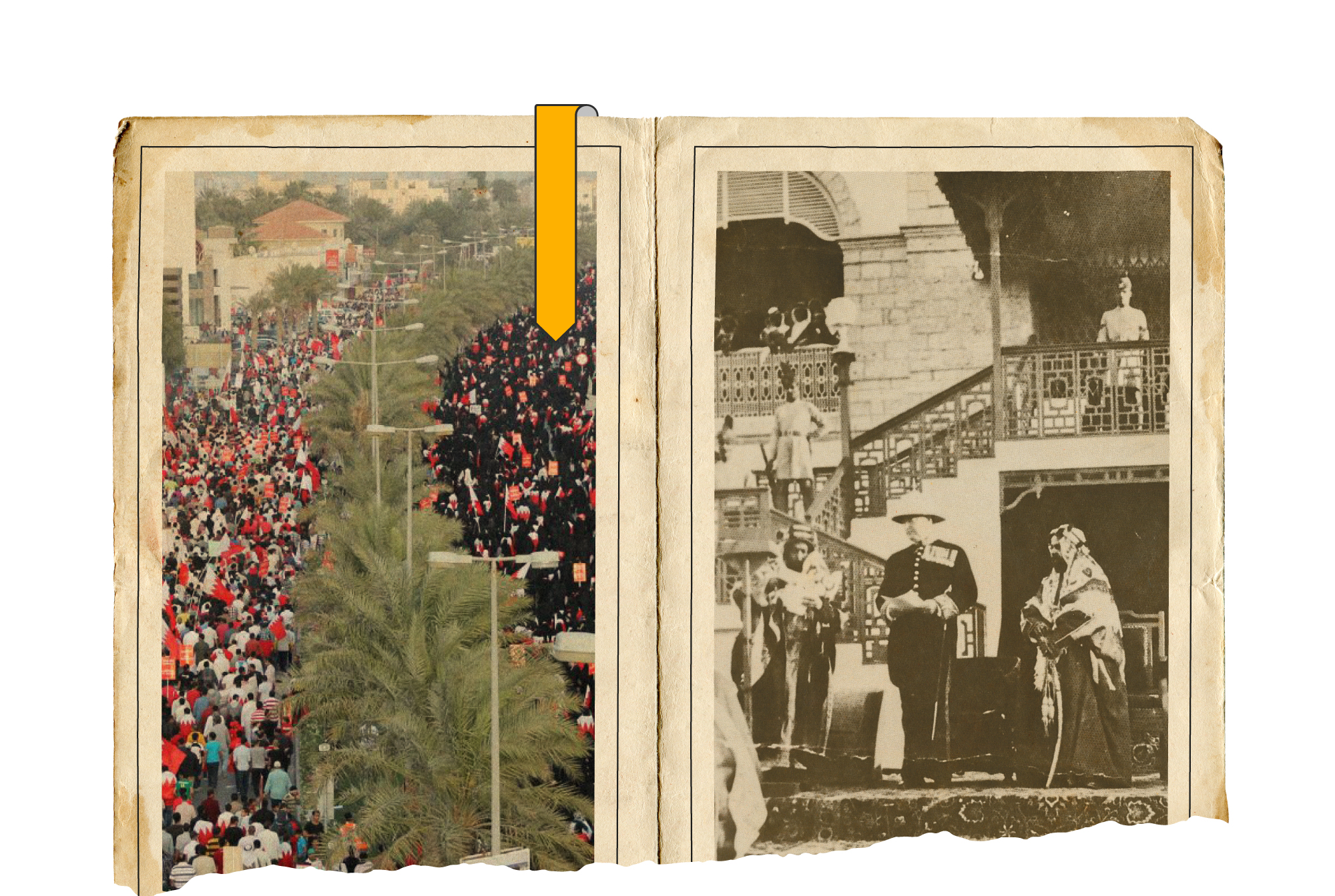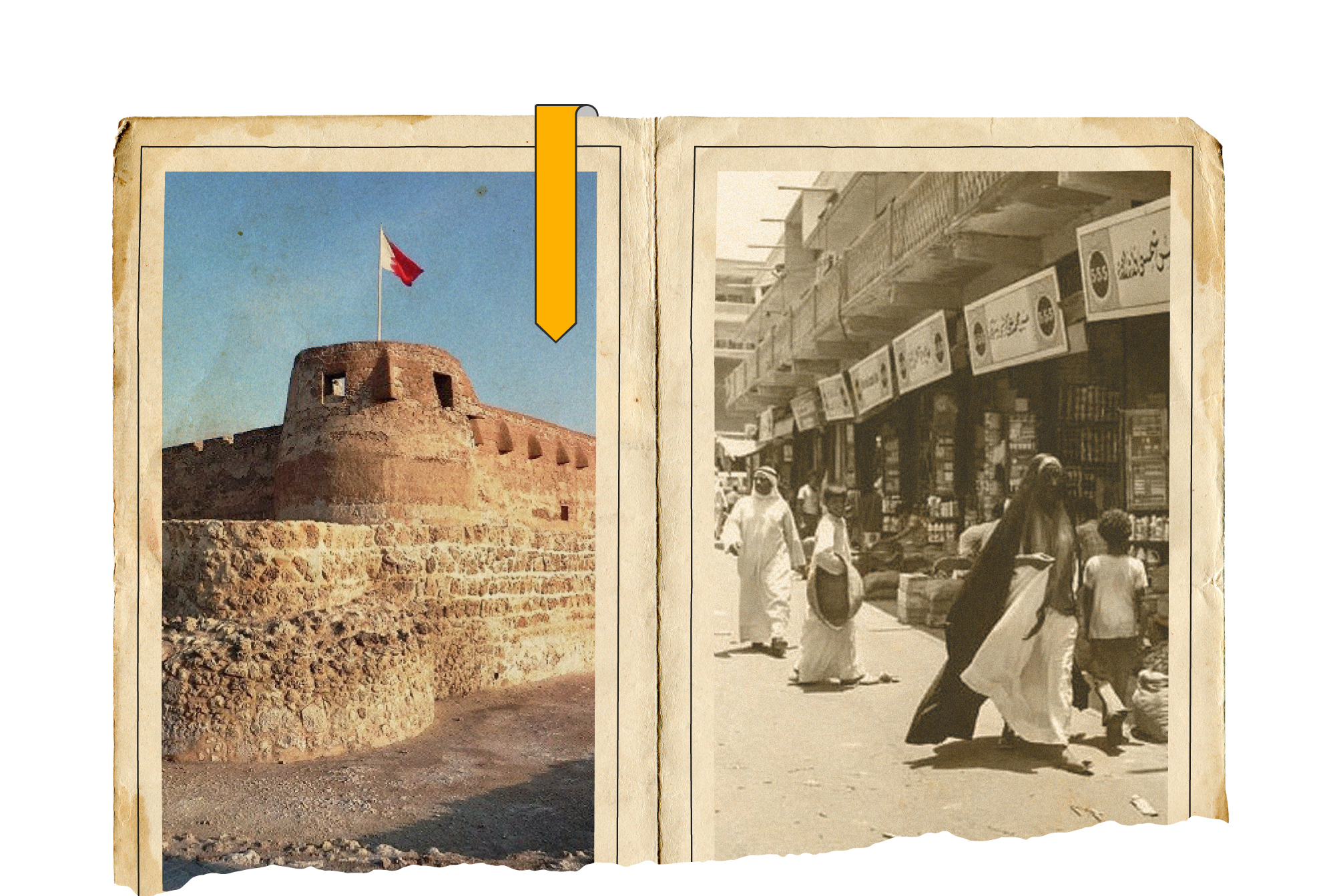
Rejected by the League of Nations and the right to self-determination
Persian policy traying to obliterate the Bahrain Arabism
Iran has always been keen to extend its influence in the Arabian Gulf region by any way, and it is obvious in its refusal to call the Gulf with the Arabian Gulf, and its insistence on the unrealistic name “Persian Gulf”; Seeking to play a greater role in the region, by presenting itself as a dominant regional power, and obtaining international recognition of that situation.
Throughout history and its stages, Bahrain was present in the Iranian ambitions towards the Arabian Gulf, since the beginning of the sixteenth century AD, the emergence of the Persian expansionist tendencies of the Safavid state, and the Safavid Shah Ismail’s desire to revive the Persian Empire again; The Persians did not find anything wrong through allying with Portuguese colonialism in order to control the Arabian Gulf, this is evident from the Prince of Hormuz’s cooperation with the Portuguese fleet in occupying Awal Island a year (1521), which known currently as Bahrain Kingdom, and a Hormuzian military garrison was placed in Qal’at al-Bahrain, most of whom were Persians.
The greatest manifestation of the Persian colonial policy towards Bahrain appeared, and it seemed clear in the era of Shah Abbas Alkabir when Abbas entered into a struggle with the Portuguese in order to replace them in controlling the capabilities of the Arabian Gulf, and he succeeded a year (1602) in ” Persian rule consolidation under the leadership of Moin al-Din Vali, who declared Bahrain’s submission to Persian rule.”
Persian colonialism did not last long in Bahrain. As the Persians entered into long and continuous struggles with the Ya’rubi state over control of Bahrain, till the disputes over leadership began between Ottomans and Al-Ahwaz Arabs, until Sheikh Bushehr Nasr Al-Madhkur took control of Bahrain in the year (1750), at that time the Al Khalifa reached Al Zubarah on the Qatari mainland, and they were able, during the reign of Sheikh Ahmed bin Muhammad Al Khalifa, nicknamed (the Conqueror), to annex the island of Bahrain (early) in the year (1782), from that time it returned to the Arabs, and it was only colonized by the Persians For a short period of time, also, they did not settle there, despite that, Bahrain remained one of the areas that most present in the expansionist Persian mentality and the areas in which they hoped to extend their influence.
By occupying them for a short period, the Persians want to impose their expansion in Bahrain after the Al Khalifa expelled them from it.

With the entry of English influence into the Arab Gulf region, a new competitor appeared to the Persian colonial ambitions in the Arab Gulf. Also, Britain stood in the face of Persia (1820) when Persia prepared a military campaign to occupy Bahrain, certainly Britain’s goal behind that was to maintain the balance of power in the region, and limit Persian ambitions in Bahrain, to serve its own interests in the Arabian Gulf.
Al Khalifa’s rule in Bahrain was a stumbling block to Persian ambitions, also among Iran’s threats was what happened in (1836) When the Persian ruler of Shiraz sent a threatening and intimidating message to Sheikh Khalifa, inviting him to declare submission to Persian rule, but Sheikh Khalifa, emphasizing Bahrain’s Arab identity, rejected the threat, while emphasizing the independence of his country.
The Persian claims of Bahrain’s subordination intensified, and developed after World War I, to the point that the matter was presented to the League of Nations in the year (1928), after back and forth, exchanging notes and speeches, the League of Nations rejected any authority of Iran over Bahrain. Despite this, Iran continued to repeat its false allegations of Bahrain’s subordination to it, in (1951) the Iranian Prime Minister Muhammad Mosaddegh nationalized the oil companies in Iran; Iran considered that nationalization includes Bahrain’s oil, under the claim of Bahrain’s subordination to it. Iran also objected to the conclusion of an agreement defining regional waters between Bahrain and Saudi Arabia, and Iranian allegations returned to the point that led to present the right of self-determination in Bahrain to the United Nations in ( 1970), indeed the people of Bahrain unanimously agreed in the referendum on Bahrain’s independence and Arabism, as Khairallah Khairallah says: “The people of Bahrain chose to be an independent state, and their independence meant their rejection of Iran, which was demanding that Bahrain be an Iranian governorate.”
The expansionist view towards Bahrain did not disappear with the demise of the Pahlavi state regime, and Khomeinist’s reach to power in Tehran, where it sharply increased with the theory of “Wilayat al-Faqih” Rule by the Islamic Jurist and revolution export. Also, he declared in (1980) his famous statements at the time about Bahrain, calling for its annexation, considering it an integral part of Iran.
With the third millennium, and the escalation of the Iranian regime’s internal and external crises, hostile statements escalated towards Bahrain, trying to distract internal attention and terrorize the external ones. The director of the semi-official Kayhan newspaper, Hossein Shariat Madari, wrote: “Bahrain is part of Iranian territory, and it separated from Iran after an illegal settlement between the Shah, Britain and America.” In (2009) The head of the General Inspection in the Office of Revolution Leader, Ali Akbar Nateq Nuri, claimed Bahrain’s dependence on Iran, describing that it was basically the fourteenth Iranian governorate, in (2011) Ahmed Jannati explicitly and publicly called for the occupation of Bahrain, in June (2012) Former Iranian ambassador to Paris, Sadiq Kharazi, stated that if Iran wanted to occupy Bahrain, it would take only a few hours to control it using Iranian Rapid Reaction Forces.
Through what has passed, it is clear to us the insistence of the Persian expansionist view towards Bahrain since the Safavid rule, and it was confirmed once again by the Pahlavi rule, also the important and dangerous developments in this policy under the rule of “Wilayat al-Faqih” Rule by the Islamic Jurist in Iran now, while the whole world affirms the Arabism of Bahrain and its connection with its Arab surroundings, this was obvious in restore the citizenship spirit in the referendum of self-determination and independence of Bahrain in the early seventies.


- Khairallah Khairallah, Bahrain and Iran, Tafah AlKayl – That’s enough, Al Arabiya website,October 9 (2015).
- Rashed Ahmed Al-Hunaiti, The Principle of Exporting the Iranian Revolution and its Impact on the Stability of the Arab Gulf Countries, Master Thesis, College of Arts and Sciences, Middle East University in Jordan (2013).
- Radwan al-Sayyid, Arabs and Iranians: Arab-Iranian Relations in the Present Time (Beirut: Arab House,2014).
- Muhammad Abdullah and Bashir Zain al-Abidin, Modern History of Bahrain (1500- 2002) (Manama: University of Bahrain,2009).


Among the Iranian attempts to pierce the Arab world
The Shah rejected Bahrain's independence in (1971) After being surprised by "self-determination"
For decades, Iran has Unduly remained claiming with Bahrain, which is only a few kilometers away from the shores of the Arabian Island, while it is more than 200 kilometers apart from the Iranian land, a geographical distance that did not convince the Iranians that they have no historical or geographical right, nor an argument or logic to advance it. Rather, it is a flimsy debate, However, in all its rulers and in all its covenants, Iran has falsely claimed with Bahrain; Because Iran is aware that Bahrain is the bridge to the Arabian Island, the old dreams that Sassanid kings have long had, from King Sapur II to Shah Reda Pahlavi, are ambitions that did not stop even with the advent of the new mullahs, but rather increased in fury and conspiracy.
Britain’s withdrawal… awaken Iranian’s greed
The British cannot be acquitted in Bahrain matter, as both Iran and Bahrain were under British influence, but they allowed Iranian ambitions to grow until the British came out of Bahrain, so that the Shah became brutal, announcing his false claim and reject its independence from Britain in (1971), also rejected referendum results, so that Iran would continue its illegal claim, although mutual recognition took place during the exchange of ambassadors between the two countries in 1999, but this was a tactic abandoned by Tehran’s mullahs.
The evil beginnings of Iranians in Bahrain
Writer and researcher Abbas Bu Safwan brings us back to the beginnings of the story, by saying: “The story began when Britain announced its withdrawal from eastern Suez in (1968), at that time the Bahraini authority was worried about the future considering the repeated Iranian claims, which were echoed under the ear and sight of the British, that Bahrain would be subordinate to it.
The Bahrainis put a lot of pressure on the British Mandate, who agreed to engage in dialogue with Iran regarding Bahrain’s independence, which led to the Iranian Shah’s agreement to grant Bahrainis the right to self-determination, which the Shah does not have this right. Nevertheless, the British granted him that matter, and after the Shah agreed to a referendum across the United Nations, the people decided to choose their independence from Iran.
Britain and the Shah’s Iran agreed to refer the matter to the UN Security Council on March 28 (1970), and the Secretary-General of the United Nations appointed his personal representative to head the fact-finding mission on Bahrain’s independence.
Iran’s claims in Bahrain were one of the main factors in fueling Bahrain’s nationalist sentiment, and reinforced the anti-Iranian feeling in Bahrain, that growing feeling remained burning in many quarters inside Bahrain who organized several initiatives and movements to resist the Iranian occupation of their country, and to preserve its Arab identity and independence. The British signs to leave Bahrain and the rest of the Gulf emirates were a first warning of the importance of gaining independence before the Iranians attack Bahrain.
Renewed Iranian ambitions in Bahrain:
Although the Iranians recognized independent Bahrain after the referendum, the extremist regime in Iran, which seized power since the year (1979); He repeated the claims and greed, as if to say that he did not recognize Bahrain independence. Rather, he went further than that, when he tried to interfere in the internal affairs, send terrorists, and try to spread instability and tension in Bahrain, in order to create an atmosphere that capable of occupying it.
Researcher Amal Medhat Abdul Hamid says in a study entitled “The Impact of Iranian Regional Policy on Arab National Security”: The Iranian parliament approved a draft law stipulating Bahrain’s subordination to Iran, considering it the fourteenth Iranian governorate, forgetting that in (1965) Iran and Britain, before its withdrawal from the Gulf, started talks about the Iranian state borders in the Arab Gulf, and these talks failed. Because of Iran’s insistence that Bahrain would be under Iranian subordination, but Iran’s ambitions in Bahrain did not end with Shah’s fall, as it was renewed at intervals, allegations and its sources were repeated from people outside regime to sources with a clear connection to the head of regime, or from elements inside The Iranian regime itself. When looking at the statements of Iranian officials, we find that there is no difference between the mentality of some of those who were at the time of Shah, and the mentality of those who belong to the Republic ideology of Iran, where the aspirations of history want to restore themselves today with the arguments of Bahrain’s subordination to Iran, and betting once again on the loyalty and affiliation of its people. Despite the expiration of those intentions since the referendum (1970), in which the Bahraini people with their Sunnah and Sha ‘ah were unanimously agreed on Bahrain Arabism.
Despite the change in the Iranian political systems, the attempt to pierce Bahrain was a constant policy of the Persians.

Between Abadan and Bahrain
Iran’s permanent justification when claiming with Bahrain was relied upon the fact that it protects the Shiite component in Bahrain, but Iran does not accept in return that the Gulf demand to protect the Arabs in Abadan and the rest of Ahwaz’s mainland, which has an Arab identity. Therefore, Iran is deliberately obscuring the real existence of the Arabs in Al-Ahwaz and its unjustified occupation of their lands, while it persists in its illegal claims in Bahrain.
The writer Abdullah Alami in his book “Iranian Ambitions in the Gulf” reveals several Iranian attempts to invade Bahrain and cause sedition one after another, including the attempt to overthrow Bahrain’s regime in 1982, which was repeated again under the mantle of what was called the Arab Spring. (2011), when it engaged in terrorist operations, smuggled weapons, and explosives to Bahrain.


- Amal Abdel Hamid, The Impact of Iranian Regional Policy on Arab National Security (Arab Democratic Center :.https://democraticac.de/).
- Khairallah Khairallah, Bahrain and Iran, Tafah AlKayl – That’s Enough, Al Arabiya website,October 9 (2015).
- Abdullah Al-Alami, Iranian Ambitions in The Gulf (Riyadh: Dar Al-Madarik, 2017).
- Atallah Al-Zaid, Saudi-Iranian Political Relations and Their Impact on Regional Security in the Arabian Gulf Region (Amman: Dar Academicians for Publishing and Distribution, 2021).
- Rashed Ahmed Al-Hunaiti, The Principle of Exporting the Iranian Revolution and its Impact on the Stability of the Arab Gulf Countries, Master Thesis, College of Arts and Sciences, Middle East University in Jordan (2013).

Bahrain...The Gordian Persian knot against claim, fraud, and forgery
The Kingdom of Bahrain formed a historical knot for Persian Iran, which kept claiming that this Arab country is an integral part of Iran. This knot made the issue of subjugating Bahrain a fixed point in the Iranian strategy, which was activated during the events of what so-called Arab Spring, had it not been for the intervention of the Saudi Arabia’s “Rock” to save Bahrain from the clutches of the mullahs.
The dream of subjugating Bahrain to Iranian influence requires an objective historical rooting, which examines the reasons for this “obsession” with occupying a sovereign state and an international figure, in order to understand and dismantle the Iranian allegations, as well as some of the Iranian-British scrambles over Bahrain, and what are the circumstances that helped in the emancipation of this country Arab from the grip of the Shah of Iran?
In this context, the Persians did not like Al Khalifa success in returning Bahrain to its Arab embrace, and were desperate “to survive due to the invasions of neighboring countries,” before “the British dominated the administration of Bahrain for a century and half, starting from 1920s.” Until the year (1970), when they imposed their political, military, and commercial influence on it, as they tried hard to preach the principles of their Christian religion, and sowed the seeds of sectarian, denominational and tribal division on the other hand.
The Persians did not like Al Khalifa family success in returning Bahrain to its Arab embrace after occupying it during the seventeenth century AD.

The Iranian claims of sovereignty over Bahrain for centuries contradict with the fact of historical testimonies that prove that the Arabs inhabited Bahrain for centuries BC, after the spread of Islam, Bahrain continued to follow the Arab Islamic countries, until the Iranian occupation in 1602 AD, with an implicit recognition of the rule of the Arab tribes in Bahrain, after the Iranian withdrawal in 1783 AD, Al Khalifa took control of it.
In this regard, it has not been proven that Iran has exercised real sovereignty over Bahrain outside the system of occupation that is not recognized by international laws and norms, just as the people and the land (as two basic of the material components of the state) had no structural relationship with Iran, therefore it is not possible to talk about the exercise of sovereignty by Iran on the territory of Bahrain.
If Iran relies, among other things, on the agreement concluded on August 30 (1822) between the British Resident in the Arab Gulf, Captain William Bruce, and the Emir of the Shiraz region who occupied Bahrain, such this agreement is considered void “given that the British Resident have no right to define areas of sovereignty in the Arabian Gulf, so that the British government punished the Resident for exceeding his powers, and transferred him from the Arabian Gulf.
Perhaps the sovereign giver was decisive in Britain’s approach first, then the United Nations secondly, towards consulting the Bahraini people, who affirmed their independence from Iran, which was expressed by the fact-finding committee headed by the Personal Representative of the Secretary-General of the United Nations, Vittorio Winsper Giuciardi, which arrived in Bahrain on the 20th. April (1970), “During this period, the UN envoy met with activists and elites… The question posed by the UN representative to the people of Bahrain he meets: Do you want Bahrain’s independence? Or do you want it to belong to Iran? The people’s answer was: We want Bahrain to be an independent state.”
It should be noted that the principle of self-determination approved by the United Nations General Assembly under Resolution 1514 of December 14 (1960) applies to Bahrain as it had a material and political presence for centuries and is not a recent political formation resulting from the separation of another political entity, which contradicts the same principle. The resolution, especially its sixth paragraph which stipulates that any attempt to undermine the national and territorial union of states is in contradiction to UN principles and goals.
Establishing the right of self-determination for the “Bahrain nation” and rejecting any affiliation to any political entity that is guaranteed and protected by Resolution 1541 of December 15 (1960), which stipulates that integration takes place “as a result of region people desires, which they freely expressed, accompanied by their full awareness of the change in their status and by known democratic methods, applied with all impartiality”.
The broad consultation of the Bahraini people confirms that the popular referendum is not and was not the only mechanism that reflects people’s opinion in determining their fate, just as Bahrainis, despite their differences on a number of issues, some of them not agreeing with the official political line, but they were unanimous, Sunni and Shiyah, about the demand for independence from any political entity, whether it is Britain, Iran or any other entity.
It can be said that Bahraini people’s attitude yesterday, and Ahwazi Arabs attitude today, definitively confirms that the Arab person rejects, by instinct, any dependence on a political entity with which he does not share the same spiritual vessel and the same ethnic connection, therefore the Arabs, regardless of their differences, are jealous of their Arab affiliation, especially when It is associated with a religious nature that originated in Islam, merged and blended with the Arabic language, which turned into the linguistic incubator of the last heavenly message. Thus, the worldly ethnic dimension related to the sacred religious dimension, to create for us a nation that God blessed with Islam, and made its religious expression unified in the language of the Qur’an.


- Taj al-Din al-Taei, Iran’s Strategy Towards the Arab Gulf States (Damascus: Raslan Publishing House, 2013).
- Abbas Busafwan, “The Complete Story of Iran’s Abandonment of Bahrain Subordination’s Claim to Persian Lands“, Al-Nasher website:http://www.abbasbusafwan.net/arabic/?p=1332
- Rashed Ahmed Al-Hunaiti, The Principle of Exporting the Iranian Revolution And Its Impact On the Stability of the Arab Gulf Countries, Master Thesis, College of Arts and Sciences, Middle East University in Jordan (2013).
- Radwan al-Sayyid, Arabs and Iranians: Arab-Iranian Relations in the Present Time (Beirut: Arab House,2014).
- Muhammad Abdullah and Bashir Zain al-Abidin, Modern History of Bahrain (1500-2002) (Manama: University of Bahrain, 2009).





